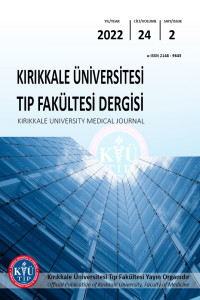Öz
Anahtar Kelimeler
Nigellla sativa Cuminum cuminum Pimpinella anisum antimicrobial effect
Kaynakça
- 1. Bahmani M, Khaksarian M, Rafieian-Kopaei M, Naser Abbasi N. Overview of the therapeutic effects of Origanum vulgare and Hypericum perforatum based on Iran’s ethnopharmacological documents. J. Clin. Diagn. 2018;12(7):1-4.
- 2. Uysal A, Zengin G, Mahomoodally MF, Picot-Allain P, Jekő J, Cziáky Z et al. A comparative study on biological properties and chemical profiles of different solvent extracts from Centaurea bingoelensis, an endemic plant of Turkey. Process Biochem. 2021;102:315-24.
- 3. Abdallah EM. Black seed (Nigella sativa) as antimicrobial drug: A mini-review. Nov Appro Drug Des Dev. 2017;3(2):1-4.
- 4. Rudra PS, Gangadharappa HV, Mruthunjaya K. Cuminum cyminum – A popular spice: an updated review. Pharmacogn J. 2017;9(3):292-301.
- 5. Amer MA, Aly UI. Antioxidant and antibacterial properties of anise (Pimpinella anisum L.). Egypt Pharm J. 2019;18(1):68-73.
- 6. Clinical and Laboratory Standard Institute (CLSI). Performance standards for antimicrobial susceptibility Testing eighteenth informational supplement. CLSI document M100-S18. 2008;28(1):46-52.
- 7. Topcagic A, Sanja Cavar Zeljkovic SC, Karalija E, Galijasevic S, Sofic E. Evaluation of phenolic profile, enzyme inhibitory and antimicrobial activities of Nigella sativa L. seed extracts. Bosn J Basic Med Sci. 2017;17(4):286-94.
- 8. Singh N, Yadav SS, Kumar S, Narashiman B. A review on traditional uses, phytochemistry, pharmacology, and clinical research of dietary spice Cuminum cyminum L. Phytother Res. 2021;35(9):5007-30.
- 9. Singh S, Das SS, Singh G, Carola Schuff C, Lampasona MP, Catalán CAN. Composition, in vitro antioxidant and antimicrobial activities of essential oil and oleoresins obtained from black cumin seeds (Nigella sativa L.). Biomed Res Int. 2014;2014:918209.
- 10. Chenab Q, Gana Z, Zhao J, Wang Y, Zhang S, Li J et al. In vitro comparison of antioxidant capacity of cumin (Cuminum cyminum L.) oils and their main components. Lwt-Food Sci Technol. 2014;55(2):632-7.
- 11. Shojaii A, Fard MA. Review of pharmacological properties and chemical constituents of Pimpinella anisum. ISRN Pharm. 2012;2012:510795.
- 12. Belal AA, Ahmed FB, Ali LI. Antibacterial activity of Cuminum cyminum L. Oil on six types of bacteria. AJBIO. 2017;5(4):70-3.
- 13. Tunon H, Olavsdotter C, Bohlin L. Evaluation of antiinflammatory activity of some Swedish medicinal plants. Inhibition of prostaglandin biosynthesis and PAF-induced exocytosis. J Ethnopharmacol. 1995;48(2):61-76.
- 14. Brown DG, May-Dracka TL, Gagnon MM, Tommasi R. Trends and exceptions of physical properties on antibacterial activity for gram-positive and gram-negative pathogens. J Med Chem. 2014;57(23):10144-61.
- 15. Yirtici U, Ergene A, Atalar MN, Adem S. Phytochemical composition, antioxidant, enzyme inhibition, antimicrobial effects, and molecular docking studies of Centaurea sivasica. South Afr J Bot. 2022;144:58-71.
Öz
Anahtar Kelimeler
Nigellla sativa Cuminum cuminum Pimpinella anisum antimikrobiyal etki
Kaynakça
- 1. Bahmani M, Khaksarian M, Rafieian-Kopaei M, Naser Abbasi N. Overview of the therapeutic effects of Origanum vulgare and Hypericum perforatum based on Iran’s ethnopharmacological documents. J. Clin. Diagn. 2018;12(7):1-4.
- 2. Uysal A, Zengin G, Mahomoodally MF, Picot-Allain P, Jekő J, Cziáky Z et al. A comparative study on biological properties and chemical profiles of different solvent extracts from Centaurea bingoelensis, an endemic plant of Turkey. Process Biochem. 2021;102:315-24.
- 3. Abdallah EM. Black seed (Nigella sativa) as antimicrobial drug: A mini-review. Nov Appro Drug Des Dev. 2017;3(2):1-4.
- 4. Rudra PS, Gangadharappa HV, Mruthunjaya K. Cuminum cyminum – A popular spice: an updated review. Pharmacogn J. 2017;9(3):292-301.
- 5. Amer MA, Aly UI. Antioxidant and antibacterial properties of anise (Pimpinella anisum L.). Egypt Pharm J. 2019;18(1):68-73.
- 6. Clinical and Laboratory Standard Institute (CLSI). Performance standards for antimicrobial susceptibility Testing eighteenth informational supplement. CLSI document M100-S18. 2008;28(1):46-52.
- 7. Topcagic A, Sanja Cavar Zeljkovic SC, Karalija E, Galijasevic S, Sofic E. Evaluation of phenolic profile, enzyme inhibitory and antimicrobial activities of Nigella sativa L. seed extracts. Bosn J Basic Med Sci. 2017;17(4):286-94.
- 8. Singh N, Yadav SS, Kumar S, Narashiman B. A review on traditional uses, phytochemistry, pharmacology, and clinical research of dietary spice Cuminum cyminum L. Phytother Res. 2021;35(9):5007-30.
- 9. Singh S, Das SS, Singh G, Carola Schuff C, Lampasona MP, Catalán CAN. Composition, in vitro antioxidant and antimicrobial activities of essential oil and oleoresins obtained from black cumin seeds (Nigella sativa L.). Biomed Res Int. 2014;2014:918209.
- 10. Chenab Q, Gana Z, Zhao J, Wang Y, Zhang S, Li J et al. In vitro comparison of antioxidant capacity of cumin (Cuminum cyminum L.) oils and their main components. Lwt-Food Sci Technol. 2014;55(2):632-7.
- 11. Shojaii A, Fard MA. Review of pharmacological properties and chemical constituents of Pimpinella anisum. ISRN Pharm. 2012;2012:510795.
- 12. Belal AA, Ahmed FB, Ali LI. Antibacterial activity of Cuminum cyminum L. Oil on six types of bacteria. AJBIO. 2017;5(4):70-3.
- 13. Tunon H, Olavsdotter C, Bohlin L. Evaluation of antiinflammatory activity of some Swedish medicinal plants. Inhibition of prostaglandin biosynthesis and PAF-induced exocytosis. J Ethnopharmacol. 1995;48(2):61-76.
- 14. Brown DG, May-Dracka TL, Gagnon MM, Tommasi R. Trends and exceptions of physical properties on antibacterial activity for gram-positive and gram-negative pathogens. J Med Chem. 2014;57(23):10144-61.
- 15. Yirtici U, Ergene A, Atalar MN, Adem S. Phytochemical composition, antioxidant, enzyme inhibition, antimicrobial effects, and molecular docking studies of Centaurea sivasica. South Afr J Bot. 2022;144:58-71.
Ayrıntılar
| Birincil Dil | Türkçe |
|---|---|
| Konular | Sağlık Kurumları Yönetimi |
| Bölüm | Makaleler |
| Yazarlar | |
| Yayımlanma Tarihi | 31 Ağustos 2022 |
| Gönderilme Tarihi | 7 Haziran 2022 |
| Yayımlandığı Sayı | Yıl 2022 Cilt: 24 Sayı: 2 |
Kaynak Göster
Bu Dergi, Kırıkkale Üniversitesi Tıp Fakültesi Yayınıdır.


